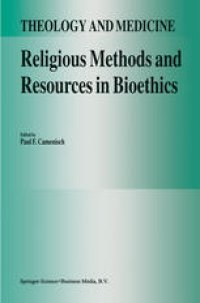
Ebook: Religious Methods and Resources in Bioethics
- Tags: Religious Studies, Ethics
- Series: Theology and Medicine 2
- Year: 1994
- Publisher: Springer Netherlands
- Edition: 1
- Language: English
- pdf
A volume on religious/theological methods in biomedical ethics inevitably of whether the methodological dimension can be distin raises the question guished from the various other things that go on in ethical discourse. It is difficult to answer this question definitively since many elements in moral conversation can be interpreted in different ways. Barbara Hilkert Andolsen illustrates this issue in this volume when she defines one of her crucial cate gories, gender justice, as being both procedural and substantive/normative. This difficulty of finally separating the methodological from the normative arises in many areas of contemporary ethical writing, both feminist and otherwise. Nevertheless, it seems that in many cases we can separate out the method ological issues with considerable precision. Albert Jonsen and James Childress achieve just such a sharp focus in their essays. This does not mean that a careful dissecting of their papers would not reveal normative elements lurking about their methodological points. It is simply to say that the issues they analyze and the positions they take are, at least prima facie, overwhelmingly method ological. They are much more about how we think about ethical matters than they are about what we think about them.
What does religion or the religious traditions have to contribute to the discussion and resolution of contemporary bioethical issues? Each of the fifteen essays written for this volume addresses this question by treating a limited area within the volume's title area, ReligiousMethods and Resources in Bioethics. The essays keep in touch with the very concrete and specific nature of bioethics by illustrating their points with selected bioethical problems or cases. Some discuss the basic resources, methods and/or presuppositions which characterize the approach to bioethical issues of an entire tradition or a significant element thereof. Traditions represented include Hinduism, Buddhism, Taoism, Islam and Judaism. Other authors, while working primarily within their own traditions - most frequently in this section in Christian thought and practice - address methodological issues which arise in a number of traditions. Such matters include casuistry, feminism, principalism and its rivals, virtue ethics, and the issue of ethics' impartial rationality. A final group addresses methodological questions within a given tradition. These include the use of scripture, and of non-canonical authoritative documents, and the role of religious practices in Christian bioethical thinking, and the use of responsa in the Jewish tradition. This volume will be of interest to any persons, beyond beginning undergraduate levels, concerned about religious contributions to bioethical issues.